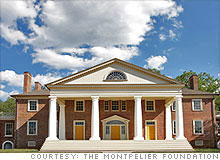Historic sites struggle during downturn
As the country prepares for the 4th of July, historic sites hope to draw visitors and donations to offset their budget woes.
 |
| Historic sites like James Madison's home of Montpelier in Virginia are looking for new ways to attract tourists. |
| MMA | 0.69% |
| $10K MMA | 0.42% |
| 6 month CD | 0.94% |
| 1 yr CD | 1.49% |
| 5 yr CD | 1.93% |
CHARLOTTESVILLE, Va. (CNNMoney.com) -- As the recession continues and Americans look for cheaper local summer getaways, historic sites are seeing visitor traffic tick up, and hope attendance will help them offset the painful drop in donations.
"Investment income is down and giving is certainly affected in a climate like this. Like many historic sites, we don't have the margins to adjust, but we are optimistic that attendance will stay high," said Leslie Green Bowman, president of Thomas Jefferson's Monticello and a member of the National Historic Trust.
Most historic homes are privately held non-profits that rely heavily on donations to make up their annual budget. Many get no financial help from the federal or state government and spend between 50 and 75% of their budgets on staffing costs. Bowman says that that makes the budget cuts much more stressful.
But according to Jim Vaughn, the vice president of Stewardship of Historic Sites for the National Historic Trust, this isn't a new development. He says that historic sites have been cutting back for the last 18 months.
"There are a lot of things we just don't have control over. We haven't had to make any drastic adjustments at sites but we have been making modest cuts where we can," he said.
The Historic Trust is a private non-profit group that oversees and provides resources for 29 historical sites across the country, including Thomas Jefferson's Monticello and James Madison's Montpelier, both in Virginia. Every year the Trust puts out a list of the most endangered historic sites around country with the hope that drawing attention to those in dire need will get them the funding they require.
To help offset the contraction in donations, Vaughn notes, many historic sites are trying new things, and offering special tours and site rentals for social events such as weddings and corporate retreats. This is a relatively new development, over the last few years and something historic homes have been loathe to do because of the risk to the buildings and artifacts.
"A lot of sites are in the middle of reinventing themselves and shifting from an exclusive focus on tourism to roles they can play in the community. The economy is forcing us to accelerate that shift and it's inviting us to be a bit braver with generating new programs and new attractions.
Both Montpelier and Monticello have recently completed new visitor centers that have drawn attention with new exhibits and offerings like archeological dig sites and "discovery rooms" that allow families to try out replicas of the historic tools in use at the time.
In recent years historic sites looked to draw attendance from all areas of the nation, with wide reaching marketing campaigns and Web sites aimed at a broad audience. As more people look to cut their travel budgets and stay closer to home, historic sites like Montpelier are changing their game plan.
"We are seeing people out of nearby metropolitan areas coming to Montpelier instead of taking that longer more expensive trip. We are looking more to those regions that are within a drive and we are looking at more current ways of communicating," said Michael Quinn, president of the Montpelier Foundation, the group that runs James Madison's Montpelier.
Jim Vaughn seconds this thought.
"I think of historic sites like small businesses. The big trend is that most sites are more and more dependent on earned income and that's making them get more creative, I think particularly in the nature of the events they are doing. They are drawing more people from the local community and are less reliant on visitors from out of state," Vaughn said.
To draw visitors, many historic sites are offering 4th of July events to entertain the community and hope to draw new crowds to historic sites. To find a 4th of July celebration at a historic site, check out your state's tourism and recreation Web site. Generally most state's have a section that lists historic sites and the events that are taking place there. You can also visit National Historic Trust Web site (http://www.preservationnation.org) to find historic sites in your area. Each site has its own Web site that lists events and dates. ![]()

